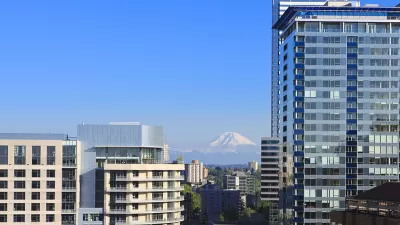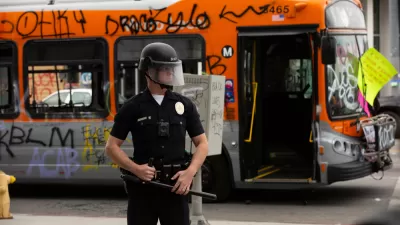Planetizen managing editor Jonathan Nettler recently spoke with Steven Anderson, founder and managing director of InfrastructureUSA, about the country's infrastructure challenges and how local communities are finding creative ways to solve them.
With the United States' overdue infrastructure tab approaching $2.3 trillion, or more, over the next decade to modernize the country's aging transportation, energy, and water infrastructure, Nettler spoke about the reasons he perceives such issues are not getting addressed and fail to get the attention they deserve:
"one challenge is that, with infrastructure, is that itʼs unseen. Itʼs something that, until thereʼs a real crisis...people assume that the people that theyʼve elected and the people theyʼre paying their taxes to are handling these problems. I think the other issue is that, certainly today, itʼs incredibly difficult to marshal the resources to tackle these issues and to get the political will behind spending money."
And on the ways in which localities are working to address their infrastructure challenges:
"what cities across the country are realizing -- you see this in Los Angeles with the "Measure R" funding, which is entirely locally funding for transit improvements; you see this recently in Chicago just last week with Mayor Emmanuelʼs announcement -- is that cities and localities are realizing that to tackle these urgent issues, theyʼre going to have to take matters into their own hands and really move beyond reliance on leadership and funding from the federal level because things just arenʼt getting done and these problems continue to get worse."
FULL STORY: Guest on The Infra Blog: Jonathan Nettler, AICP, Managing Editor, Planetizen

Planetizen Federal Action Tracker
A weekly monitor of how Trump’s orders and actions are impacting planners and planning in America.

Map: Where Senate Republicans Want to Sell Your Public Lands
For public land advocates, the Senate Republicans’ proposal to sell millions of acres of public land in the West is “the biggest fight of their careers.”

Restaurant Patios Were a Pandemic Win — Why Were They so Hard to Keep?
Social distancing requirements and changes in travel patterns prompted cities to pilot new uses for street and sidewalk space. Then it got complicated.

Maui's Vacation Rental Debate Turns Ugly
Verbal attacks, misinformation campaigns and fistfights plague a high-stakes debate to convert thousands of vacation rentals into long-term housing.

San Francisco Suspends Traffic Calming Amidst Record Deaths
Citing “a challenging fiscal landscape,” the city will cease the program on the heels of 42 traffic deaths, including 24 pedestrians.

California Homeless Arrests, Citations Spike After Ruling
An investigation reveals that anti-homeless actions increased up to 500% after Grants Pass v. Johnson — even in cities claiming no policy change.
Urban Design for Planners 1: Software Tools
This six-course series explores essential urban design concepts using open source software and equips planners with the tools they need to participate fully in the urban design process.
Planning for Universal Design
Learn the tools for implementing Universal Design in planning regulations.
Heyer Gruel & Associates PA
JM Goldson LLC
Custer County Colorado
City of Camden Redevelopment Agency
City of Astoria
Transportation Research & Education Center (TREC) at Portland State University
Camden Redevelopment Agency
City of Claremont
Municipality of Princeton (NJ)





























